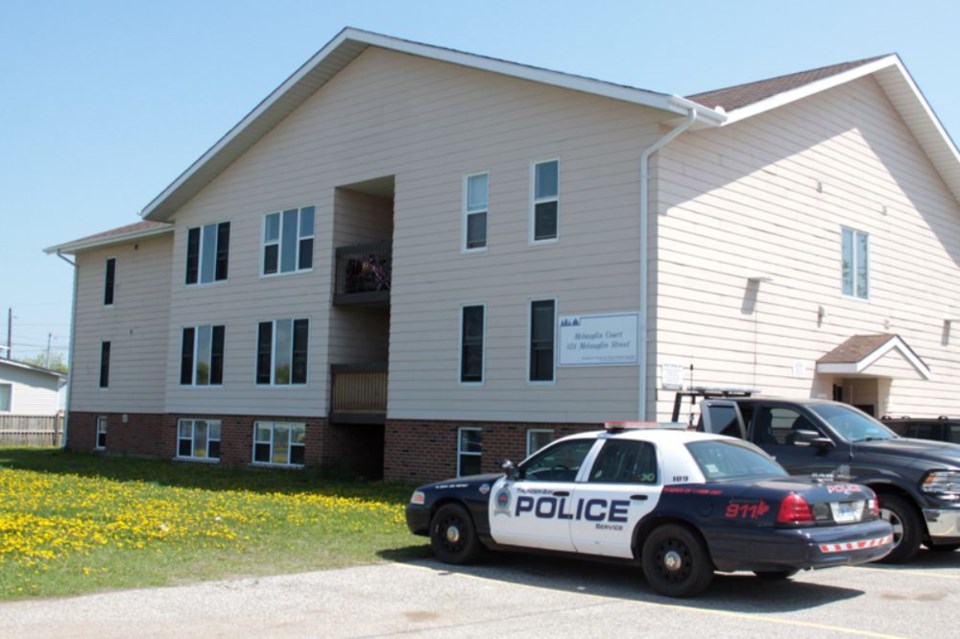THUNDER BAY – David Wilson was overwhelmed with homicidal urges and was in a psychotic state when he fatally stabbed Robert Barbeau, testified a psychiatrist who examined the accused murderer in the months immediately following the killing.
Forensic psychiatrist Dr. Robert Sheppard was called to the witness stand Friday during the fifth day of the second-degree murder trial, which will determine whether Wilson is criminally responsible for the slaying of the 48-year-old Barbeau.
Sheppard conducted an assessment of Wilson, who had first been diagnosed with schizophrenia about 20 years before, at the Thunder Bay Regional Health Sciences Centre beginning nearly one month after the stabbing.
In his report, he concluded Wilson’s illness had been getting progressively worse over the previous six months and there was a long-term pattern of psychotically motivated activity, including an assault on his nephew 11 days prior to the stabbing and telling a neighbour just two days before the stabbing he was having urges to kill.
Sheppard said he believes Wilson’s motivations were not based in reality and lacked the ability to recognize his actions as being wrong to be criminally responsible for stabbing Barbeau in the head in the parking lot of their McLaughlin Street apartment building on the evening of June 5, 2014.
“He did have some capacity to know right from wrong but because he was struggling with these thoughts and overwhelmed by them he lacked the capacity in this case,” Sheppard said.
Wilson was arrested in his apartment early the following morning. His explanation for why he didn’t attempt to flee or evade police was that he knew he was in trouble and wanted to spend one more night with his cat.
Sheppard disagreed with a later assessment conducted by forensic psychiatrist Dr. Mark Pearce, who assessed Wilson nearly eight months later and concluded Wilson reacted out of anger and a past history with Barbeau and should be held criminally responsible.
“In my view we had a clearer view of his mental state at the time of the offence,” Sheppard said.
Earlier this week Pearce told the court he observed several “red flags” that led him to believe Wilson was embellishing experiencing psychotic symptoms to cover his motivations for attacking Barbeau.
But Sheppard told the court it will likely never be known exactly what fueled Wilson’s violent assault.
“I believe at that point he did not know why he acted that way,” Sheppard said.
Sheppard acknowledged there had been a contentious history between Wilson and Barbeau but described it as a long-standing conflict that he did not believe was an active concern for Wilson.
During his testimony earlier this week, Pearce disagreed with that characterization and said he believed Wilson had a hatred for Barbeau for a number of different incidents and past grievances, including a belief Barbeau possessed a master key to his apartment and would break in.
Pearce cited instances of Wilson saying he was “going for the insanity plea” after being arrested as evidence he had the capacity for rational thought and had control of his actions.
But Sheppard said he believed there was too much emphasis placed on that one instance, which he described as being consistent with how Wilson presented himself superficially despite still struggling with severe symptoms.
Wilson had been progressively losing control of his illness for about six months prior to the incident, which included him quitting his job of a decade because of paranoid thoughts that his co-workers were stealing from him.
It escalated on May 24, 2014 when Wilson hit his nephew over the head with a guitar and stabbed him with a box cutter.
His nephew declined to press charges, instead urging police to take Wilson to the hospital to undergo a psychiatric evaluation but he was not admitted and discharged later that night.
Sheppard said Wilson was not admitted because he seemed relatively stable, calm and reasonable, describing the outburst as a momentary lapse of anger.
Just two days before the stabbing Wilson told a neighbour he was having homicidal thoughts. She contacted police with her concerns but they were ultimately dismissed.
Sheppard told the court those instances provide evidence there was a pattern of his illness and delusional symptoms causing violent outbursts.
Under cross-examination from Crown prosecutor Rob Kozak, Sheppard was asked about whether examples of rational thought, such as spending the night with the cat or the insanity plea remark, made it possible the stabbing wasn’t driven by psychosis.
“I think it’s probable his actions were the manifestations of illness,” he said. “That’s the most probable explanation in my mind.”
The defence and Crown are scheduled to present closing arguments starting Monday morning.
